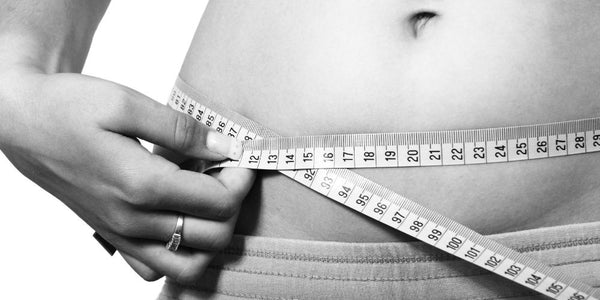Not Losing Weight Despite Cutting Calories? Read This to unlock weight loss!
Rory Batt MSc: Nutritionist
The concept of a 'calorie deficit' is almost synonymous with weight loss, with the prevailing wisdom being that in order to lose weight a person must ‘cut’ calories.
The whole ‘energy balance’ thing, where in order to lose weight someone has to eat less calories than their body uses, assumes that the body is a perfect machine and works on the notion that food is energy and nothing more than that.
If we reduce food to only the calories that it contains, then we completely overlook the different food groups and the different metabolic, immune and hormonal instructions that each one sends to the body.
Take fat, protein and carbohydrates for example. They all, as well as containing calories, have their own unique barcodes that your genes ‘scan’. The body launches different responses to different barcodes, based on the different foods groups eaten.
So basically, even though you may eat 500 calories of purely fat vs 500 calories of purely carbohydrate - the body's response will be pretty different on a hormonal level.

There's a lot more to nutrition or losing weight than simply calories. You're often advised to keep it simple, but calorie counting may not work for everyone and the success may depend on the macros
A Calorie Is Not A Calorie
They are not like for like……I’ll give you a few real world examples of this.
So one study which compared the impact of a low-fat diet, a mediterranean diet and a low carb diet in overweight individuals over 2 years on weight loss found that;
The weight loss was most significant in the Mediterranean diet and low carb groups, and ended up being pretty similar. But the key difference was that the low-carb diet achieved this weight loss without calorie restriction (*).
You know what else? On the other side of the equation, there have been documented cases of eating less calories than expenditure leading to weight gain.
The Pima Indian tribe in Arizona were studied based on the anomalous effects of how their diets were impacting their weight. Even though their physical activity would outweigh the amount of food they ate, they were still gaining weight and suffering from metabolic disease (*).
This has come to be known as the Pima Paradox, and was partially the result of the introduction of more (western) carbohydrates into their diets. Even though there was little to no change in the amount of energy, the change in where that energy came from led to weight gain and ill health.
How is this possible? It has something to do with what happens on a hormonal and cellular level when carbohydrates are consumed vs fats. In the case of the Pima, there is also a genetic component which we will talk about later.
Carbs are anabolic - they tell the body to grow by releasing the hormone insulin. This tells the body to take up energy in the form of sugar into muscles, and into fat tissue. High carb intake usually leads to more signals to store energy in fat tissue.
Lowering carbs and increasing fat reduces that insulin signal significantly, and hence the instructions to store energy as fat.
So even though you replace 500 calories of fat with 500 calories of carbs, the bodies hormonal and metabolic response will mean it’s not so ‘pro growth’
There’s also the advantage to increasing the release of fullness hormones such as CCK, which gets released in response to fat and protein intake, making it harder to overeat with higher fat, as well as promoting feelings of fullness.
A low-carb diet was also better at promoting fullness than a low fat diet, as higher amounts of a fullness hormone PYY were found in response to the low-carb diet (*).
Levels of Ghrelin were also lower (an appetite stimulating hormone) on a low carb diet vs higher carb diet (*), which translates into better appetite control.
However, low-carb diets do reduce levels of Leptin, which is a fullness hormone - so it’s good not to go too low carb, and include moderate amounts occasionally just to balance leptin.
But the point here is to highlight that the hormonal response to fats vs carbohydrates is very different - meaning there is more to food than just calories…..
But you’d be right to question how we’ve come this far believing that when calories are reduced, weight loss occurs. Because there have been many many studies showing that whether it’s low fat, low carb, or high protein diets - when calories are restricted, weight loss does usually occur….
But the real question is, sustainability. Reducing calories can tell the body to reduce its metabolic rate, because it thinks that energy has become more scarce, so it adapts to this potential environmental threat.
It does this by reducing levels of the hormone leptin, which additionally reduces the suppression of hunger whilst at the same time reducing energy expenditure (or metabolic rate). Whilast metabolism is slowed whilst hunger is increased, this sets the scene for a strong rebound effect, which can lead to the regaining of the weight, and even more than before.
So ideally, calorie restriction doesn’t want to be too extreme, and also is good to combine with a tweaking of what proportion of fat, protein and carbohydrates make up an individual's diet.

Other Hidden Reasons Cutting Calories Doesn’t Work
So for those people who can’t seem to lose weight no matter how low they drop their calories….
What Your Calories Are Made Up From
We’ve already covered one of the main contributors, which is the proportion of fat vs protein vs carbohydrate that makes up your total calorie intake.
Your Current Hormonal State
(stress, sleep, feeding times)
Inflammation
Are you eating low calorie foods that are also inflammatory?
This is where you get truly duped with ready meals. They may be low calorie, giving all the green lights to think they are ok (it’s literally on the packaging). But really, a lot of the ingredients in there like Trans Fats, Hydrogenated oils, preservatives and emulsifiers are inflammatory.
Some are directly inflammatory, others set off an inflammatory cascade which can lead to something called ‘meta-inflammation - or metabolic inflammation.
This phenomena can scramble the body's ability to respond to the normal hormonal signals, and lead to weight gain.
Inflammation in general messes with the hormonal and immune regulation of metabolism, and here are other culprits:
- Environmental chemicals like Bisphenol A, Pesticides and Phthalates. Heating plastic ready meal containers is not good for plastics exposure. In addition, some of the actual foods ingredients may contain pesticide residues too.
- Underlying gastrointestinal infections - create meta-inflammation in response to eating certain foods. Need to deal with the infections in order to correct metabolism.
- Nutritional excess of sugar and omega-6 fatty acids
- Nutritional deficiency (especially magnesium and Vitamin D - which are actually very common)
- Sedentary lifestyle
Genes
In the case of the Pima Paradox - when they switched up their carbohydrate intake, their genes were simply not well equipped to deal with these kinds of foods.
This is not to say that people are doomed because of genes. It’s just saying that in certain situations, in response to certain foods, it causes some people's genes to express in a negative way.
Finding the right foods, amounts and sources can express positive genetic activity leading to weight loss.
The Pima through genetic evolution were used to being faced with times of hardship, where food was scarce - therefore their genes had adapted to be ultra ‘Thrifty’ and maximize the amount of energy extracted from each meal. This is what led to the excessive weight gain from relatively low calorie intake.
The same can be seen as a result of the Dutch famine. Children born from the victims of the famine faced issues with obesity in response to more processed type foods, because their genes had been instructed to act in a way to extract as much sustenance from each meal.
For people with ‘Thrifty’ genes, it’s best to play around with what sources of food best match them, as well as practicing a certain degree of calorie control, avoiding processed foods, eating fresh whole foods, as well as exercising regularly.





